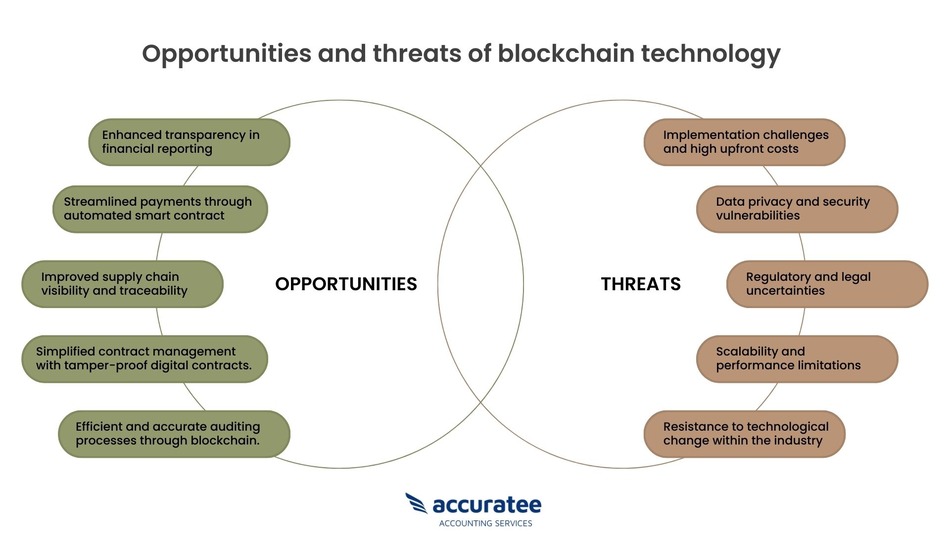How can blockchain technology revolutionize accounting processes for construction companies?
Introduction:
Did you know that the construction industry is the second least digitized industry in the world, according to a study by McKinsey & Company? This lack of digitization can lead to significant inefficiencies in accounting processes, which are already notoriously complex in the construction industry.
However, there's hope on the horizon. Blockchain technology has the potential to revolutionize accounting processes in construction, bringing greater transparency and efficiency to the industry.
In this blog post, we'll explore how blockchain can address these challenges and transform how construction companies manage their finances.
Key takeaways
Blockchain can transform construction accounting with secure and efficient management of financial data.
Blockchain can speed up payments and reduce errors in construction projects.
Blockchain's data record is immutable, preventing fraud in construction and eliminating the need for audits.
Blockchain enables decentralized marketplaces for construction-related goods and services, connecting buyers and sellers securely and efficiently.
What is blockchain technology in construction?
Blockchain technology in construction is a digital way of keeping track of important information and data about construction projects. It works like a digital ledger or database where encrypted data blocks are stored and chained together, forming a chronological and reliable source of truth for the information. This information includes building plans, construction contracts, and payment information.
Blockchain technology is beneficial because it allows all parties involved in the construction project to have real-time access to the same information, making it easier to coordinate tasks and avoid misunderstandings. Additionally, any changes made to the report are documented and preserved, ensuring the accuracy and transparency of the data.
Because of its inherent security measures, blockchain technology can be used in almost every construction industry sector to streamline processes and improve efficiency. It provides a secure and transparent way to manage construction projects, making it easier for everyone involved to work together towards a common goal.
Key features of blockchain technology
-
Immutable record:
Blockchain technology creates an immutable record of all the data, meaning tampering with or altering the information without leaving a trace is virtually impossible. This ensures that all parties involved can trust the accuracy and reliability of the data.
-
Secure:
Blockchain technology provides a secure way to store and exchange data, as the information is encrypted and only accessible by authorized users. This ensures that all parties involved have fast access to the same information, reducing the risk of errors or misunderstandings.
-
Efficient:
Blockchain technology makes it easier to coordinate tasks and keep track of progress, reducing the time and effort required to complete a construction project. Additionally, using digital currencies can help streamline payments and reduce transaction costs.
-
Scalable:
Blockchain technology can be scaled up or down depending on the project's needs, making it suitable for any size or scope of the construction project. This makes it a versatile tool that can manage both large-scale and small-scale projects efficiently.
Try out our flexible price packages that are custom tailored to reflect the needs of your business.
Fixed fee packages
Understanding blockchain technology in construction accounting
As a construction business owner, you are likely aware of the importance of accurate accounting and financial management. One such technology that has shown promise for the finance and accounting industry is blockchain. In fact, it is the only technology that is directly linked with accounting standards.
Blockchain's ability to provide verification and reliability is precisely what the accounting equation requires. Even though the traditional accounting process involves careful record-keeping, the records still need to be checked by third-party, independent auditors, which can be time-consuming and significantly raise accounting costs.
When blockchain technology combines with existing accounting software for construction, it has far-reaching implications for every sector. It helps create a more simplified, more robust accounting sector that focuses on the everyday chores of managing financial data.
For construction companies, this could mean a more streamlined accounting process, resulting in cost savings and better financial management. With the demand for high-quality human-added value and intellectual power on the rise, blockchain may be the catalyst that propels the accounting profession to new heights, benefiting the construction industry as well.
How is blockchain technology revolutionizing construction accounting?
-
Blockchain could eliminate the need for audits:
As discussed above, blockchain technology stores all transaction records in a shared ledger accessible to authorized people. These records are secured by cryptography, making it extremely difficult to manipulate or destroy them. This feature could eliminate the need for audits in the future, as it prevents fraudulent activities such as cooking the books.
However, this may change the role of auditors or make them unnecessary. In the future, auditors may need additional certifications in blockchain technology to identify and report any abuses. Auditors may no longer be accountants but blockchain experts trained to detect any misuse of this technology.
-
The introduction of smart contracts in construction accounting:
Another way in which blockchain technology can revolutionize the accounting department of a construction company is through the use of smart contracts. Smart contracts are digital contracts automatically executed when certain conditions are met. This means that transactions can be completed without manual input or verification.
For example, a payment could be released automatically after a specific project or task is completed. Smart contracts work as digital escrow, eliminating the need for third parties to manage transactions. This could save time and money in terms of administrative paperwork and reduce the risk of fraud.
-
Blockchain technology facilitates immediate payments:
In the construction industry, traditional payment processes can be time-consuming and prone to errors. It can take several days or even a week for large construction corporations to complete the payment process.
However, this process can be revolutionized with the introduction of blockchain technology. Blockchain offers real-time processing, eliminating the need for transactions to be delayed or put on hold. This is because digital records that utilize blockchain can facilitate instant settlements through the network.
For instance, construction's standard clearing and settlement time is typically three days. With the adoption of blockchain, this can be replaced with near-instant settlements that benefit construction companies by reducing overhead costs and eliminating errors caused by delays.
-
Blockchain facilitates the triple-entry accounting system:
The construction industry has traditionally relied on double-entry accounting to manage its finances. This method, dating back to the 15th century, requires every transaction to be recorded twice in separate accounts.
However, with the emergence of blockchain technology, the construction sector can now leverage the benefits of triple-entry accounting. This system adds a layer of security by recording every transaction on a blockchain, which is cryptographically sealed to safeguard the integrity of the data.
-
Blockchain facilitates standardization:
Blockchain technology can also facilitate standardization in the construction sector. By enabling different users to enter and share data on a ledger, this technology can help create industry-wide standards that all companies must adhere to.
This reduces discrepancies among invoice requirements, differing payment terms, and other inconsistencies that could lead to company disputes.
-
Blockchain is simplifying supply chain management:
Another way in which blockchain technology is revolutionizing the construction accounting department is by streamlining the tracking of materials and supplies used for a project.
For instance, it is possible to instantly track the origin of materials used in construction projects using blockchain. This helps to ensure that materials are sourced ethically and sustainably, as well as helps to avoid counterfeit products.
It can also help improve operations by allowing construction companies to keep track of their supply chain and monitor inventory levels in real time. This reduces the risk of disruption due to supply chain issues and helps to optimize the resources used in a project.
Turn Your Bookkeeping into a Breeze!
Future of blockchain in construction accounting: Opportunities and threats
Implementing blockchain technology in construction accounting holds immense potential for the industry, offering advantages such as transparency, real-time tracking, increased accuracy, and streamlined project management.
However, the high implementation and maintenance costs, technical complexity, and regulatory challenges may impede its adoption. Construction companies should carefully evaluate the opportunities and threats associated with blockchain technology and develop a comprehensive plan to integrate it into their accounting systems.
The following image presents a clear overview of the opportunities and threats of using blockchain technology in construction accounting:

How can construction accountants lead?
While blockchains have the potential to automate many of the routines and error-prone bookkeeping tasks traditionally performed by accountants and bookkeepers, there is an opportunity for the accounting profession to redefine its role.
Rather than being limited to essential bookkeeping functions, accountants can establish themselves as a community of business advisors who offer professional insights and guidance to organizations in managing financial challenges in the digital age. Five key areas where construction accountants play an immense role are as follows:
-
Areas that need professional judgment:
Although purchase and sale transactions are recorded on a blockchain in real-time, purchasing materials and supplies decisions still require professional judgment from a financial perspective.
-
Tax compliance:
Blockchains can help automate tax calculations, but they must provide the necessary advice and guidance when filing taxes in different jurisdictions or managing international taxation obligations.
-
Compliance with anti-money laundering regulation:
Even though blockchain technology provides reliable transparency between transactions, accountants can still help ensure that companies comply with applicable money laundering and fraud prevention legislation.
-
Business consulting:
Although blockchain technology can do routine bookkeeping tasks, accountants are still needed to provide guidance and advice on financial matters. This includes helping organizations understand their data and how it can be used to make informed business decisions.
-
Risk management:
As blockchain technology is relatively new, there may be unknown risks associated with using it. Accountants can help identify and manage these risks to ensure companies comply with all applicable regulations.
-
Data analytics:
Blockchain technology provides access to unprecedented data about financial transactions, which can be used to gain insights into business performance. Accountants are well-positioned to use this data for decision-making and forecasting purposes.
Conclusion
Blockchain technology presents immense potential for the construction industry in streamlining and enhancing the accounting process. As a result of increased efficiency and accuracy levels, significant investments in IT and software-related expenses will no longer be required.
Additionally, contractual agreements between all parties involved in construction business relationships will be better enforced due to completely transparent ledgers; this could help reduce construction fraud in the long run.
With great potential for revolutionizing accounting and bookkeeping for construction business, those working in the industry should strive to stay informed of all technological advancements and adjust their processes accordingly.
At CleanSlate, we understand that the transition to blockchain technology involves risks and challenges. We have the experience and expertise to help organizations navigate these challenges and ensure compliance with applicable laws, regulations and industry standards.
Contact us today for more information on how we can help your organization make the most of blockchain technology.









